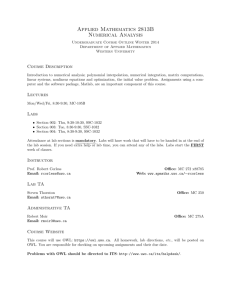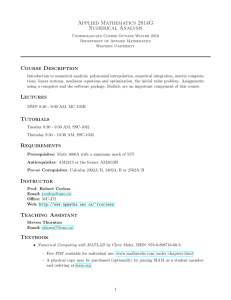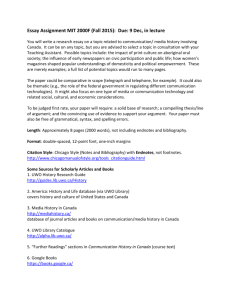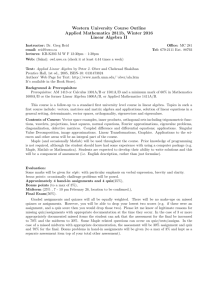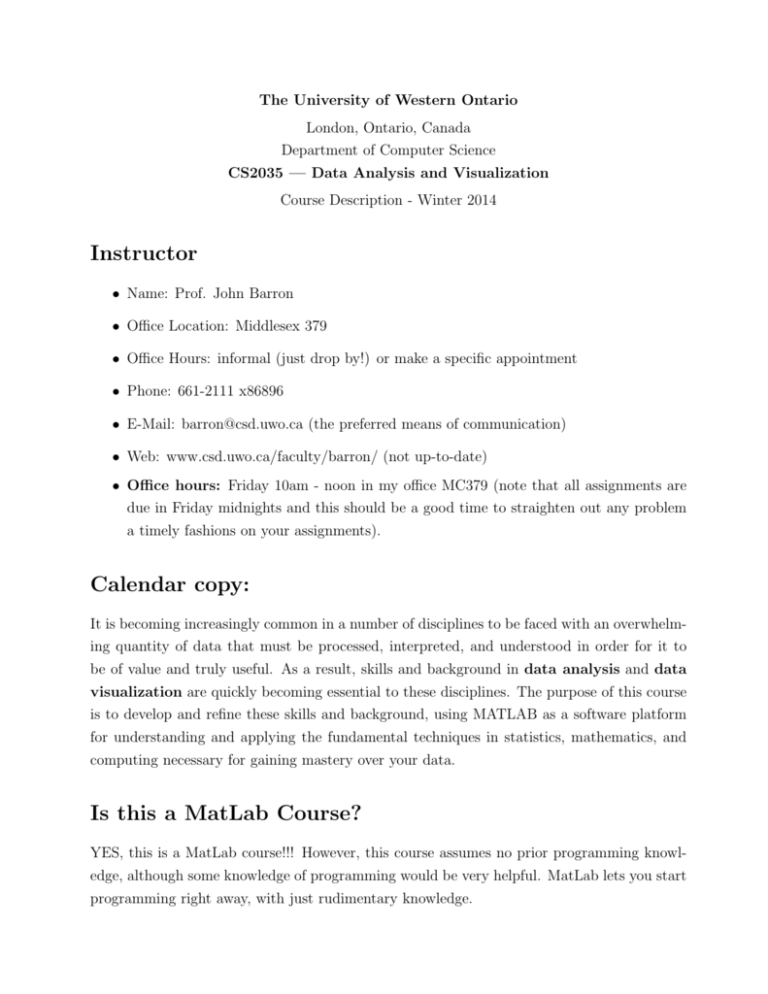
The University of Western Ontario
London, Ontario, Canada
Department of Computer Science
CS2035 — Data Analysis and Visualization
Course Description - Winter 2014
Instructor
• Name: Prof. John Barron
• Office Location: Middlesex 379
• Office Hours: informal (just drop by!) or make a specific appointment
• Phone: 661-2111 x86896
• E-Mail: barron@csd.uwo.ca (the preferred means of communication)
• Web: www.csd.uwo.ca/faculty/barron/ (not up-to-date)
• Office hours: Friday 10am - noon in my office MC379 (note that all assignments are
due in Friday midnights and this should be a good time to straighten out any problem
a timely fashions on your assignments).
Calendar copy:
It is becoming increasingly common in a number of disciplines to be faced with an overwhelming quantity of data that must be processed, interpreted, and understood in order for it to
be of value and truly useful. As a result, skills and background in data analysis and data
visualization are quickly becoming essential to these disciplines. The purpose of this course
is to develop and refine these skills and background, using MATLAB as a software platform
for understanding and applying the fundamental techniques in statistics, mathematics, and
computing necessary for gaining mastery over your data.
Is this a MatLab Course?
YES, this is a MatLab course!!! However, this course assumes no prior programming knowledge, although some knowledge of programming would be very helpful. MatLab lets you start
programming right away, with just rudimentary knowledge.
Prerequisites
1.0 courses in Applied Mathematics, Calculus, Mathematics, Statistics (including Introductory
Statistics), or the former Linear Algebra, or permission of the Department/Instructor. Beware
of the following Dean’s rule:
Unless you have either the requisites for this course or written special permission
from your Dean to enroll in it, you may be removed from this course and it will
be deleted from your record. This decision may not be appealed. You will receive
no adjustment to your fees in the event that you are dropped from a course for
failing to have the necessary prerequisites.
Course Resources:
1. Text: Mastering MATLAB, Duane Hanselmann and Bruce Littlefield, Pearson (Prentice
Hall), 2012. However, any MATLAB textbook would mostly like be sufficient.
2. The course notes and some MATLAB functions and data will be on the course webpage.
3. All MATLAB toolboxes are fully documented on www.mathworks.com/help/documentationcenter.html.
4. Mathworks offers a number of Webinars on various topics on www.mathworks.com.
5. Mathworks also offers online documentation, discussion forums, and numerous other
resources.
6. Google can find just about anything to do with MATLAB.
7. Course webpage at www.csd.uwo.ca/Courses/CS2035b.
Class and Lab time schedule:
• Monday 3:30-5:30pm class - SH2317
• Friday 2:30-3:30pm class - SH2317
• Friday 3:30-4:30pm lab - HSB16
2
Important Dates
The following are important days that may affect students taking CS2035b:
1. First day of classes - January 6th
2. Last Day of classes - April 8th
3. Family day - Monday, February 17th, (holiday)
4. Reading week (also known as skiing week) - Monday to Friday, Feb 17-21 (this week if
time off and Family day is the first day off)
5. Good Friday, April 18th
6. Easter Sunday, April 20th
7. Passover, April 15th
8. Study days (before exam) - April 9th and 10th.
9. Exam Period - April 11th-30th (17 days) [Typically the final exam date will be released
early in the term but students are required to attend the exam, Purchasing a cheap
ticket to go home and then find out the exam is after you travel ternary is not sufficient
ground for as appeal.
10. Application deadline for Spring Convocation is March 15 (spring convocation is June
11th to 14th and June 17th to 19th).
Lab, Assignment and Exam Dates
1. Each lab is due on the Friday of that lab: Lab 1: January 17th, Lab 2: January 24th,
Lab 3: January 31st, Lab 4: Feb 7th, Lab 5: Feb 14th, Lab 6: Feb 28th, Lab 7: March
7th, Lab 8: March 15th, Lab 9: March 22nd, Lab 10: March 29nd, Lab 11: April 4th
and Lab 12: cancelled. Each lab is worth 1 mark (for a maximum of 10 marks).
2. All students receive 1 mark for the cancelled lab 12 (and this counts as a completed
lab)!!!
3. Assignment 1 is worth 5% and is due January 31st at midnight.
4. Assignment 2 is worth 10% and is due February 7th at midnight.
3
5. Assignment 3 is worth 10% and is due February 28th at midnight
6. Assignment 4 is worth 10% and is due March 26th at midnight.
7. Midterm Exam is February 28th in class (1 hour exam, open book but no laptops or
cellphones allowed) and worth 20%.
8. Final Exam TBA (3 hours, open book, no laptop or cellphones allowed) and worth 35%
(or 55% is you do better on the final exam than on the midterm).
Email Contact:
We occasionally need to send email messages to the class or to students individually. Email is
sent to your UWO email address as assigned to you by ITS (Information Technology Services).
It is your responsibility to read this email frequently and regularly. You may wish to have
this email forwarded to an alternative email address. See the ITS website for directions on
forwarding email. Nevertheless, emails sent out to your uwo email address will assume to
have been received. You should note that email at ITS and other email providers may have
quotas or limits on the amount of space they dedicate to each account. Unchecked mail may
accumulate beyond these limits and you may be unable to retrieve important messages from
your instructors. This is your responsibility tom monitor and is not an acceptable excuse for
not having received an email!!! You are encouraged to contact the course instructor via email,
with concise and appropriate questions you may have regarding course and lecture materials
or clarification of assignments. Note that email sent from accounts different from ITS may
not reach its destination: hence you are instructed to send your questions with your UWO
account to be on the safe side..
Course Website:
Aim your browser at www.csd.uwo.ca/courses/CS2035b. Assignment source pdf files will
be available there. Also course lectures and lecture MatLab program will be available from
there. Assignment will be submitted and marks posted on owl (details to follow).
Teaching Assistant:
Ayan Chaudhury (achaud29@csd.uwo.ca), Office Hours TBA.
4
Lecture and Lab Schedule:
The timetable for lectures and labs are posted at:
https://studentservices.uwo.ca/secure/Timetables/mastertt/ttindex.cfm
There are 3 hours of lecture per week and the duration of labs is one hour per week. The
purpose of the labs is to introduce or expand on the core material of this course, and to provide
programming exercises with concepts. Lab instructions are posted on the course website, and
include material that must be read before the lab. Attendance at labs is a required part of
the course. Missing labs is a stupid way to lose easy marks!!!
Computing Facilities:
Those in HSB16, a general ITS university computing lab. Many people will have their own
MatLab versions non their laptops: these are acceptable as long as they are version 2009 or
better.
Other Labs:
• There are other labs available to you that are open on the weekend.
• These include NCB105 and SS1032 as well as the Genlab located in Taylor Library.
• Hours for the these labs can be found at:
https://www.uwo.ca/its/genlabs/hours.html
The locations of all UWO labs can be found at:
https://www.uwo.ca/its/genlabs/genlabs-western.pdf
Course Outline:
This course is broken down into down into 3 modules.
5
Module 1: Introduction to MATLAB and the MATLAB
toolboxes
1. The components of MATLAB (command window, editor, figures, toolboxes)
2. Simple MATLAB programming
3. Data types (single, double, integer, character arrays, records, cells)
4. Variables and arrays
5. Control flow (loops, while, if-then-else, switch (case) statements)
6. Simple I/0 (reading/writing binary, ASCII and mat files)
7. Some built-in mathematical MATLAB functions
8. Scripts and functions (*.m files)
9. Arrays and simple array operations
10. Multidimensional arrays
11. Simple 2D/3D plots and the print statement
12. Matrix algebra
13. Serialization versus Vectorization, JIT compilation
14. Serialized versus Vectorized I/O
15. Graphical User Interfaces (GUIs)
16. MATLAB Programming Interfaces (such as C, Fortran and Java)
17. Interfacing MATLAB and Excel
Module 2: Basic Data Visualization
1. Setting the camera and the lighting model
2. Mesh and surface plots
3. Colormaps and texture
6
4. Representation arbitrary shaped 3D objects using patches
5. Using transparency to display data
6. Volume Visualization: scalar values, slice planes, isosurfaces, vector data
7. Stream lines/ribbons and tubes
8. Images, movies and sound
Module 3: Basic Data Analysis
1. Some basic operations: mean, standard deviation, weighted average, median, covariance
matrices
2. Random number generation
3. Histograms
4. Data correlation (Pearson’s coefficient)
5. Hypothesis testing (z-test and t-test)
6. Chi-square goodness-of-fit and other variance tests
7. Regression analysis (including linear, nonlinear and robust regression)
8. Scatter/Box/Distribution plotting
9. Probability Density/Cumulative distributions
10. Normal, Exponential, Poisson, Rayleigh, Rican distributions
11. Performance curves (ROC)
Note: This list of topics many be too ambitious to teach in a 0.5 credit 1 term course. In
this case, an appropriate subset of this material will be taught.
Lecture Notes: will be available on the course website, http://www.csd.uwo.ca/courses/CS2035b/.
These notes and MatLab code relevant to the lectures will be password protected and the password will be given out in class. The username is: class.
7
Labs:
Lab instructions will be available on the course website in advance, and students must bring
a hard copy to the lab. It is expected that students will come prepared to the labs by reading
the instructions and performing any preparatory work in advance. Labs begin during the
second week of classes. There is a total of 12 labs. Each completed lab is worth 1% of your
final grade. Since there are 12 labs for a total of 10you are not required to complete 2 labs at
most. There are no bonus marks for completing more than 10 labs. You must attend the lab
session for which you are registered. There are no make-up labs and students who are absent
for a lab do not have the option of attending another lab. Students must bring their UWO
identification to all labs.
Other Grading Restrictions
• If for any reason the assignment schedule cannot be adhered to, the assignment marks
will be pro-rated. The assignments are worth 35% of the overall mark for the course.
If an assignment has to be cancelled for any reason, the remaining assignment weights
will be prorated to add up to 35%.
• If you obtain a higher grade on the final than on the midterm the final grade make will
count for the complete exam grade.
• If you miss the midterm exam for a valid verified reason, the final exam make will
comprise the entire exam mark. There will be no midterm makeup exam.
• You need to pass the assignments to pass the course.
• You need to obtain 40% on the exams to pass the course.
• You need to obtain 50% on the exams to receive a grade of 65% or more in the course.
• Neither cellphones or laptop computed can be brought to exams. We cannot be responsible for the storage of these devices at the front of the class. Procession of either of
these devices will be considered to constitute cheating!!!
Appeal of Assignment Marks
1. Appeals of assignment marks should be addressed to your T.A. first. If you and the
T.A. cannot agree, then the T.A. will discuss the situation with the instructor.
8
2. Appeals must occur within 1 week from the first day that the marked assignments were
made available to students. After that 1 week period has gone by, no further appeals
will be considered and the marks are considered final. Note that this rule applies even
if assignments are not picked up when passed back. The week countdown starts from
the date the assignment is passed back.
Late Assignment Policy:
Assignment due dates are always at 11:55pm (via Owl). Hardcopies of your assignments are
not necessary and the Owl date of submission will be the “official” date if submission. Assignments mailed to the instructor or TA will not be accepted. Assignments passed in 1 day late
will have 5% deducted while assignments passed in 2 days late will have 10% deducted. No
assignments will be accepted after 2 days. Saturday and Sunday count as 1 day in determining
the lateness of an assignment.
Extensions can only be granted by the course instructor. If you have serious medical
or compassionate grounds for an extension, you should take supporting documentation to
the Academic Counseling office of your faculty, who will contact the instructor. Workload,
exams, minor illnesses, and home computer problems are not valid reasons for being unable
to complete an assignment within the allotted time.
Academic Accommodation for Medical Illness:
If you are unable to meet a course requirement due to illness or other serious circumstances,
you must provide valid medical or other supporting documentation to your Academic Counseling office as soon as possible and contact your instructor immediately. It is the student’s
responsibility to make alternative arrangements with their instructor once the accommodation
has been approved and the instructor has been informed. For further information please see:
www.uwo.ca/univsec/handbook/appeals/accommodation_medical.pdf
A student requiring academic accommodation due to illness should use the Student Medical
Certificate when visiting an off-campus medical facility or an Accommodation Certificate from
Student Health Services. This form can be found at:
http://www.uwo.ca/univsec/handbook/appeals/medicalform.pdf
9
Ethical Conduct:
Scholastic offenses are taken seriously and students are directed to read the appropriate policy,
specifically, the definition of what constitutes a Scholastic Offense, at the following Web site:
http://www.uwo.ca/univsec/handbook/appeals/scholoff.pdf
Plagiarism: Students must write their essays and assignments in their own words. Whenever students take an idea, or a passage from another author, they must acknowledge their
debt both by using quotation marks where appropriate and by proper referencing such as
footnotes or citations. Plagiarism is a major academic offense. All assignments are individual
assignments. You may discuss approaches to problems among yourselves; however, the actual
details of the work (assignment coding, answers to concept questions, etc.) must be an individual effort. Assignments that are judged to be the result of academic dishonesty will, for
the student’s first offense, be given a mark of zero with an additional penalty equal to the
weight of the assignment also being applied. You are responsible for reading and respecting
the Department of Computer Science policy on Scholastic Offenses and Rules of Ethical Conduct. The University of Western Ontario may use software for plagiarism checking. Students
may be required to submit their written work and programs in electronic form for plagiarism
checking.
Statement on Academic Offenses
Scholastic offenses are taken seriously and students are directed to read the appropriate policy,
specifically, the definition of what constitutes a Scholastic Offense, at the following web site:
www.uwo.ca/univsec/handbook/appeals/scholastic_discipline_undergrad.pdf.
Additionally,
1. All required papers may be subject to submission for textual similarity review to the
commercial plagiarism detection software under license to the University for the detection of plagiarism. All papers submitted for such checking will be included as source
documents in the reference database for the purpose of detecting plagiarism of papers
subsequently submitted to the system. Use of the service is subject to the licensing
agreement, currently between The University of Western Ontario and Turnitin.com (
http://www.turnitin.com).
10
2. Computer-marked multiple-choice tests and/or exams may be subject to submission for
similarity review by software that will check for unusual coincidences in answer patterns
that may indicate cheating.
Tutoring:
The role of tutoring is to help students understand course material. Tutors should not write
part or all of an assignment. Having employed the same tutor as another student is not a
legitimate defense against an accusation of collusion, should two or more students hand in
assignments considered similar beyond the possibility of coincidence.
Mental Health:
Students who are in emotional/mental distress should refer to Mental Health website:
Health@Western http://www.uwo.ca/uwocom/mentalhealth/
for a complete list of options about how to obtain help.
Accessibility:
Please contact the course instructor if you require material in an alternate format or if you
require any other arrangements to make this course more accessible to you. You may also wish
to contact Services for Students with Disabilities (SSD) at 661-2111 x 82147 for any specific
question regarding an accommodation.
11

